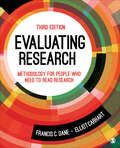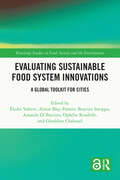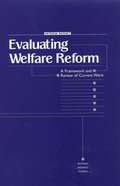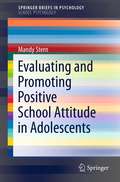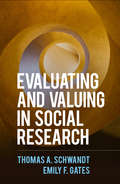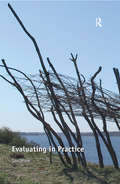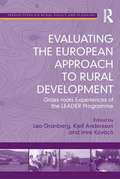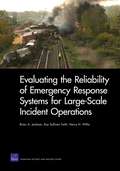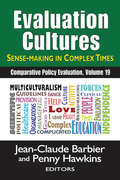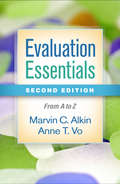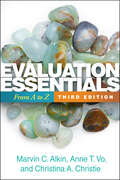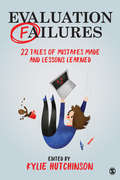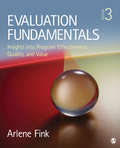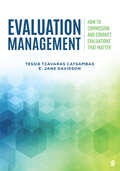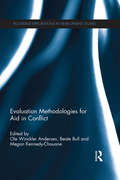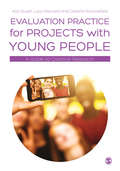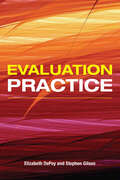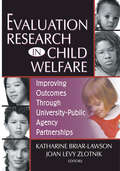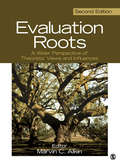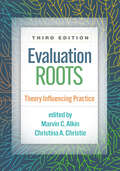- Table View
- List View
Evaluating Research: Methodology for People Who Need to Read Research
by Francis C. Dane Elliot Donald CarhartThe third edition of Evaluating Research by Francis C. Dane and Elliot Carhart provides students with the skills to read and evaluate research studies. Aimed at courses where it is more important for students to develop an understanding of methods, rather than conduct their own research, this book covers all aspects of reading social, behavioral, and health science research from the basics, such as the structure of reports and accessing research, as well as overviews of the main types of research methods. The authors emphasize critical reading skills to enable students to become experts in evaluating research, so students can decide whether to incorporate that research into their future professional activities. Each chapter includes an overview at the beginning and exercises at the end to reinforce the content learned. Starting from the basic principles of why we do research, the book moves readers through the practicalities of finding studies to the principles of the scientific method and how to break down and analyze research reports. New to the third edition, Understanding Checks placed throughout each chapter help students cement their learning. The organization of the book is now more logical, with a new chapter on accessing research up front and ending with a chapter on statistical analyses. New research examples throughout, including such topical examples as mindfulness, college attendance, and bias in healthcare, help students see the relevance of research in their lives.
Evaluating Sustainable Food System Innovations: A Global Toolkit for Cities (Routledge Studies in Food, Society and the Environment)
by Alison Blay-Palmer Élodie Valette Amanda Di Battista Beatrice Intoppa Ophélie Roudelle Géraldine ChaboudThis book presents URBAL, an approach that applies impact pathway mapping to understand how food system innovations in cities, and their territories, change and impact food system sustainability. Around the world, people are finding innovative ways to make their food systems more sustainable. However, documenting and understanding how these innovations impact the sustainability of food system can be a challenge. The Urban Driven Innovations for Sustainable Food Systems (URBAL) methodology responds to these constraints by providing innovations with a simple, open-source, resource-efficient tool that is easily appropriated and adaptable to different contexts. URBAL is designed to respond to the demands of field stakeholders, whether public or private, to accompany and guide them in their actions and decision-making with regard to sustainability objectives. This book presents this qualitative and participatory impact assessment method of food innovations and applies it to several cases of food innovation around the world, including the impact of agricultural districts in Milan, chefs and gastronomy in Brasilia, e-commerce in Vietnam, eco-friendly farm systems in Berlin and The Nourish to Flourish governance process in Cape Town. The book demonstrates how food innovations can impact different dimensions of sustainability, positively and negatively, and identify the elements that facilitate or hinder these impacts. The volume reflects on how to strengthen the capacity of these stakeholders to disseminate their innovations on other scales to contribute to the transition towards more sustainable food systems. This book will be of great interest to students and scholars working on sustainable food systems, urban food, food innovation and impact assessment, as well as policymakers, practitioners and funders interested in these areas.
Evaluating Welfare Reform: A Framework and Review of Current Work
by Panel On Data Methods for Measuring the Effects of Changes in Social Welfare ProgramsThe National Academies Press (NAP)--publisher for the National Academies--publishes more than 200 books a year offering the most authoritative views, definitive information, and groundbreaking recommendations on a wide range of topics in science, engineering, and health. Our books are unique in that they are authored by the nation's leading experts in every scientific field.
Evaluating and Promoting Positive School Attitude in Adolescents
by Mandy SternAt a time when rates of depression and other mental health problems are increasing significantly among high school students, measures of school attitude and well-being are of central importance to school practitioners. Students with positive attitudes about school experience more beneficial outcomes and are also less likely to engage in maladaptive, risky behaviors. Therefore, monitoring how students feel about their experiences at school is important, and a novel, fresh approach to examining school attitude is sorely needed. Past studies of school attitude have generally focused on internal, psychological correlates of school attitude, such as individual and subjective reports of students' attitude toward school and their motivation levels. Evaluating and Promoting Positive School Attitude in Adolescents goes beyond these traditional measurements and explores less psychologically focused indicators, including ecological factors and observable behaviors. This study provides school psychologists with a new, comprehensive, and ecologically based approach with which to evaluate the school attitude of high school students.
Evaluating and Valuing in Social Research
by Thomas A. Schwandt Emily F. GatesMuch applied research takes place as if complex social problems--and evaluations of interventions to address them--can be dealt with in a purely technical way. In contrast, this groundbreaking book offers an alternative approach that incorporates sustained, systematic reflection about researchers' values, what values research promotes, how decisions about what to value are made and by whom, and how judging the value of social interventions takes place. The authors offer practical and conceptual guidance to help researchers engage meaningfully with value conflicts and refine their capacity to engage in deliberative argumentation. Pedagogical features include a detailed evaluation case, "Bridge to Practice" exercises and annotated resources in most chapters, and an end-of-book glossary.
Evaluating in Practice
by Ian ShawEvaluation is not a self-contained phase of social work practice - one more dimension of the process - but a dimension of every phase. In this fully rewritten and updated second edition of his groundbreaking text Evaluating in Practice, Ian Shaw demonstrates how evaluation and inquiry are just as much practice tasks as planning, intervention and review. By demonstrating that good evaluating in practice helps sustain a commitment to evidence, understanding and justice, Shaw shows that for this to be achieved, evaluating in practice must permeate every aspect of social work. He: 1. Develops a framework for embedding evaluation and inquiry as a dimension of good practice in social work. 2. Demonstrates the central significance of a 'methodological practice' in social work that adapts, infuses, and translates social research methods as a dimension of the different aspects of social work, viz. assessment, planning, intervention, review and outcomes. 3. Facilitates good practice by exemplifying the argument through extensive worked examples and exercises. This book has much to say about the demanding skills that are necessary to achieve this shaping of practice and is a must-read for any social work student or practitioner.
Evaluating the "Keep Your Health Plan Fix": Implications for the Affordable Care Act Compared to Legislative Alternatives
by Christine Eibner Evan SaltzmanThis report describes a comparative analysis of three proposals to allow Americans to keep their existing health plans under the Affordable Care Act (ACA). The proposals are evaluated based on their potential impact on the ACA-compliant market and the cost and coverage of health insurance. The possibility of each proposal causing a “death spiral” in the ACA-compliant market is also addressed.
Evaluating the European Approach to Rural Development: Grass-roots Experiences of the LEADER Programme (Perspectives on Rural Policy and Planning)
by Kjell Andersson Leo GranbergThe LEADER programme, initiated in 1991, aims to improve the development potential of rural areas in the European Union by drawing on local initiatives and skills. Highlighting this unique policy approach, this book presents up-to-date research results on LEADER’s achievements and restrictions at the local level in a comparative way in order to discuss its merits and problems. What makes LEADER important is not only that it has a major role in rural development efforts, but also that it has a pioneering role in the new type of governance, participatory democracy. Asking whether LEADER strengthens local democracy or not, this book also looks at how it affects the power balance among stakeholders, between national and local actors and between genders. It questions whether LEADER projects are genuinely grass-root level activities, reflecting local needs and ideals; and if the approach brings local know-how back onto the development agenda in innovations and development activities. Finally, the authors examine the success of dissemination of knowledge within the LEADER programme to other regions.
Evaluating the Reliability of Emergency Response Systems for Large-Scale Incident Operations
by Henry H. Willis Brian A. Jackson Kay Sullivan FaithThe ability to measure emergency preparedness is critical for policy analysis in homeland security. Yet it remains difficult to know how prepared a response system is to deal with large-scale incidents, whether it be a natural disaster, terrorist attack, or industrial or transportation accident. This volume describes a method, based on the concept of system reliability, for evaluating the preparedness of emergency response systems.
Evaluation Cultures: Sense-Making in Complex Times (Comparative Policy Evaluation Ser.)
by Penny Hawkins Jean-Claude BarbierEvaluation Cultures draws upon a sample of reflections, drawn from organizational practices, nationally centered political cultures, and ethnic cultures, as a framework for understanding how culture influences the work of evaluation. Two main conclusions seem to emerge: first, that there exists no single, uniform, and homogenous national evaluation culture; second, that the idea of a unified transnational culture of evaluation is an illusion.The evaluation community includes a diverse group of professionals; a diversity that is not just represented in national or ethnic culture but also in academic backgrounds, public and private sector allegiances, and personal character. The contributors to this book represent, in part, this diversity by reflecting a range of views.Evaluation Cultures draws upon the experience of senior evaluation practitioners, who share their reflections on their practice and experience, in order to put forth challenges to purely academic analysis. Evaluation Cultures presents a consistent, if not exhaustive, attempt to give analytical and empirical sense to all of the cultures of the evaluation community.
Evaluation Essentials, Second Edition: From A to Z
by Marvin C. Alkin Anne T. VoThoroughly revised and updated, this engaging text has given thousands of students and new evaluators the practical information and expert advice needed to conduct or use evaluations. In 26 concise sections, the book describes how to articulate answerable evaluation questions, collect and analyze data using both quantitative and qualitative methods, and deal with contingencies that might alter the traditional sequence of an evaluation. Special strengths of the text are its attention to individual, organizational, and community culture and emphasis on building collaborative relationships with stakeholders. An in-depth case study and related end-of-section exercises (including group activities) help students put themselves in the evaluator role. Other pedagogical features include section titles written as questions, bulleted recaps of each section, "Thinking Ahead" and "Next Steps" pointers, cautionary notes, and suggestions for further reading. New to This Edition *New and expanded topics: evaluation contracts, budgeting, surveys, data visualization, qualitative coding and memoing, factors affecting evaluation use, and context-sensitive evaluation. *Revised case study with extended exercises that guide the reader to complete a simulated evaluation. *End-of-section "Quick Read" links to recommended American Evaluation Association blog posts. *Four entirely new sections (such as "How Do You Strengthen Relationships with Stakeholders?" and "How Do We Plan a Process-Focused Evaluation Design?"), plus other changes and additions throughout.
Evaluation Essentials: From A to Z
by Christina A. Christie Marvin C. Alkin Anne T. VoBeloved for its conversational style and reliable advice, this text is now in a revised and updated third edition, reflecting key developments in evaluation. It includes expanded coverage of equity and social justice issues, values and cost analysis, visualizing qualitative data with software, and more. Twenty-six concise chapters, or "sessions," give students, applied researchers, and program administrators a solid foundation for conducting or using evaluations. Covering both quantitative and qualitative methods, the book emphasizes fostering evaluation use. It shows how to build collaborative relationships with users; formulate answerable evaluation questions; deal with contingencies that might alter the traditional sequence of an evaluation; and collect, analyze, and report data. Student-friendly features throughout the sessions include titles written as questions, bulleted recaps, "Thinking Ahead" and "Next Steps" pointers, cautionary notes, and annotated suggestions for further reading. An in-depth case study provides the basis for end-of-session practice exercises. New to This Edition *New sessions on context-sensitive evaluation, including the organizational, sociopolitical, and community contexts of a program. *New or expanded discussions of timely topics: identifying evaluation decision makers, analyzing program costs, coding and visualizing qualitative data with software, and more. *Updated suggestions for further reading and discussion in every chapter.
Evaluation Failures: 22 Tales of Mistakes Made and Lessons Learned
by Kylie Hutchinson"This is the evaluation book we′ve been waiting for! A must-read for all learning and working in the field." –Amanda M. Olejarski, West Chester University Evaluation Failures: 22 Tales of Mistakes Made and Lessons Learned is a candid collection of stories from seasoned evaluators from a variety of sectors sharing professional mistakes they have made in the past, and what they learned moving forward. As the only book of its kind, editor Kylie Hutchinson has collected a series of engaging, real-life examples that are both entertaining and informative. Each story offers universal lessons as takeaways, and discussion questions for reflective practice. The book is the perfect companion to anyone working in the evaluation field, and to instructors of program evaluation courses who want to bring the real world into their classroom.
Evaluation Failures: 22 Tales of Mistakes Made and Lessons Learned
by Kylie Hutchinson"This is the evaluation book we′ve been waiting for! A must-read for all learning and working in the field." –Amanda M. Olejarski, West Chester University Evaluation Failures: 22 Tales of Mistakes Made and Lessons Learned is a candid collection of stories from seasoned evaluators from a variety of sectors sharing professional mistakes they have made in the past, and what they learned moving forward. As the only book of its kind, editor Kylie Hutchinson has collected a series of engaging, real-life examples that are both entertaining and informative. Each story offers universal lessons as takeaways, and discussion questions for reflective practice. The book is the perfect companion to anyone working in the evaluation field, and to instructors of program evaluation courses who want to bring the real world into their classroom.
Evaluation Fundamentals: Insights into Program Effectiveness, Quality, and Value
by Arlene G. FinkThe Third Edition of Arlene Fink’s Evaluation Fundamentals teaches the basic concepts and vocabulary necessary to do program evaluations and review the quality of evaluation research to make informed decisions about methods and outcomes to meet scientific and community needs. Dr. Fink thoroughly examines such issues as how to justify evaluation questions and set standards of effectiveness, design studies, identify best practices, and conduct ethical research. The book contains numerous examples of evaluation methods, as well as evaluation reports. It also includes practice exercises and suggested readings in print and online. Individuals can use the New Edition successfully on their own or in small or large groups.
Evaluation Fundamentals: Insights into Program Effectiveness, Quality, and Value
by Arlene G. FinkThe Third Edition of Arlene Fink’s Evaluation Fundamentals teaches the basic concepts and vocabulary necessary to do program evaluations and review the quality of evaluation research to make informed decisions about methods and outcomes to meet scientific and community needs. Dr. Fink thoroughly examines such issues as how to justify evaluation questions and set standards of effectiveness, design studies, identify best practices, and conduct ethical research. The book contains numerous examples of evaluation methods, as well as evaluation reports. It also includes practice exercises and suggested readings in print and online. Individuals can use the New Edition successfully on their own or in small or large groups.
Evaluation Management: How to Commission and Conduct Evaluations that Matter
by Anastasia (Tessie) Catsambas E. Jane DavidsonEvaluation Management: How to Commission and Conduct Evaluations that Matter helps evaluation teams and commissioners achieve results that meet utilization and organizational learning goals and inform positive change for programs and communities. Tessie Tzavaras Catsambas and E. Jane Davidson provide insights on both the tactical and strategic levels of evaluation management, using approaches and skills from project management, administration and logistics, budgeting, team management, leadership development, communication, coaching, systems thinking, and negotiation. They also demonstrate how intentionality for equity, sustainability and culturally responsive practices is essential for ensuring an evaluation’s relevance and enhancing productive stakeholder engagement. With plenty of practical guidance from many years of experience, the authors provide a valuable resource for student readers, experienced evaluators, and commissioners of evaluation.
Evaluation Management: How to Commission and Conduct Evaluations that Matter
by Anastasia (Tessie) Catsambas E. Jane DavidsonEvaluation Management: How to Commission and Conduct Evaluations that Matter helps evaluation teams and commissioners achieve results that meet utilization and organizational learning goals and inform positive change for programs and communities. Tessie Tzavaras Catsambas and E. Jane Davidson provide insights on both the tactical and strategic levels of evaluation management, using approaches and skills from project management, administration and logistics, budgeting, team management, leadership development, communication, coaching, systems thinking, and negotiation. They also demonstrate how intentionality for equity, sustainability and culturally responsive practices is essential for ensuring an evaluation’s relevance and enhancing productive stakeholder engagement. With plenty of practical guidance from many years of experience, the authors provide a valuable resource for student readers, experienced evaluators, and commissioners of evaluation.
Evaluation Methodologies for Aid in Conflict (Routledge Explorations in Development Studies)
by Ole Winckler Andersen Beate Bull Megan Kennedy-ChouaneKnowledge and rigorous evidence around the role of external development partners in situations of conflict and fragility is still lacking. There is little accountability for the billions in aid being spent in places like Afghanistan, Iraq and the Democratic Republic of Congo. This book analyses evaluation theory and practice in order to help fill this knowledge gap and advocates a realistic and rigorous approach to evaluating international engagement. Through a series of case studies, this book highlights both the promise, and potential pitfalls, of taking a more evaluative approach to understanding aid in conflict regions. These illustrate the methodological and analytical approach taken by researchers working to understand the results and effectiveness of conflict prevention and peacebuilding support. While well-grounded in current theoretical and methodological debates, the book provides valuable practical information by examining how and why different choices were made in the context of each evaluation. The book shows what future steps may be envisaged to further strengthen evaluations of support for conflict prevention and peacebuilding. The analysis draws on a wealth of perspectives and voices to provide researchers and students in development studies and conflict and peace studies as well as development evaluators with a deep and broad understanding of evaluation methods and approaches.
Evaluation Practice for Projects with Young People: A Guide to Creative Research
by Lucy Maynard Caroline Rouncefield Kaz StuartThis straightforward and original text sets out best practice for designing, conducting and analysing research on work with young people. A creative and practical guide to evaluation, it provides the tools needed to bridge the gap between theoretical knowledge and applied practice. Written by an experienced, erudite team of authors this book provides clear, pragmatic advice that can be taken into the classroom and the field. The book: Provides strategies for involving young people in research and evaluation Showcases creative and participatory methods Weaves a real world project through each chapter, highlighting challenges and opportunities at each stage of an evaluation; readers are thus able to compare approaches Is accompanied by a website with downloadable worksheets, templates and videos from the authors This is the ideal text for postgraduate students and practitioners who work with young people in the statutory and voluntary sectors.
Evaluation Practice for Projects with Young People: A Guide to Creative Research
by Lucy Maynard Caroline Rouncefield Kaz StuartThis straightforward and original text sets out best practice for designing, conducting and analysing research on work with young people. A creative and practical guide to evaluation, it provides the tools needed to bridge the gap between theoretical knowledge and applied practice. Written by an experienced, erudite team of authors this book provides clear, pragmatic advice that can be taken into the classroom and the field. The book: Provides strategies for involving young people in research and evaluation Showcases creative and participatory methods Weaves a real world project through each chapter, highlighting challenges and opportunities at each stage of an evaluation; readers are thus able to compare approaches Is accompanied by a website with downloadable worksheets, templates and videos from the authors This is the ideal text for postgraduate students and practitioners who work with young people in the statutory and voluntary sectors.
Evaluation Practice: How To Do Good Evaluation Research In Work Settings
by Elizabeth DePoy Stephen GilsonEvaluation Practice bridges the apparent gap between practice and research to present a logical, systematic model to guide all professional thinking and action within the context of everyday professional life. Their framework embraces diverse theories, action, and sets of evidence from a range of professional and disciplinary perspectives.
Evaluation Research in Child Welfare: Improving Outcomes Through University-Public Agency Partnerships
by Katharine Briar-Lawson Joan Levy ZlotnikSince the 1980s, child welfare agencies and social work programs in more than 40 states have come together to address recruitment and retention issues by preparing social work students for child welfare practice-and to enhance the delivery of child welfare services. This book documents the outcomes of these partnerships to help you assess their value and sustainability! Evaluation Research in Child Welfare: Improving Outcomes Through University-Public Agency Partnerships is a critical examination of the diverse outcomes-and strategies for assessing them-of university/public child welfare agency partnerships designed to prepare social work students for public child welfare practice. This informative book addresses outcomes of these specialized training efforts which were supported by federal Title IV-E and Title IV-B Section 426 funds. Special attention is paid to programs addressing diversity and cultural competence through staff development. The book follows the process of tracking the career paths of students in several states (large and small, rural and urban), as well as cross-state collaborations that include university, agency, consumer, and student partnerships. From the Editors: "Rising drug problems such as crack and cocaine addiction, along with co-occurring challenges such as poverty, domestic violence, and mental health issues, have helped to reinforce the need to have the most effective services delivered by the most well-prepared staff. Moreover, such challenges compel the most relevant, scientifically based approaches, requiring a closer connection of public child welfare systems to social work education programs and related academic disciplines. The articles featured in this book serve as progress markers for this re-professionalization initiative. They constitute snapshots of some of the current progress in workforce development, including social work based education, training, and capacity building in public child welfare. They also reflect social work/public child welfare partnerships and the lessons that are being learned when the research, educational, and service resources of schools of social work are harnessed to build a better trained work force that can provide improved services." In this informative book, you'll find a national overview of historical efforts to promote professional social work practice in child welfare, as well as examinations of: special challenges presented by privatized systems curricula and agencies training opportunities that grow from research partnerships the importance and impact of racial and ethnic diversity for future social workers the cultural competency needs of BSW and MSW students the differing cultural perspectives of universities and agencies-which must be bridged to create successful partnerships the benefits of these partnerships in terms of outcomes for students, clients, agencies, and social work education programs
Evaluation Roots: A Wider Perspective of Theorists’ Views and Influences
by Marvin C. AlkinEvaluation Roots: A Wider Perspective of Theorists’ Views and Influences, Second Edition provides an updated examination of current evaluation theories and traces their evolution. Marvin C. Alkin shows how theories build upon theories and how the theories are related to each other. The way in which these evaluation "roots" grew to form a tree helps to provide a better understanding of evaluation theory. In addition to the editor's overview, the book contains essays by leading evaluation theorists. In these pieces, the evaluators comment on their own development and give their views of their placement upon the tree. **All royalties from sales of this book are donated to support the AEA Research on Evaluation Student Award.**
Evaluation Roots: Theory Influencing Practice
by Christina A. Christie Marvin C. AlkinShowing how evaluation practice looks when guided by theory, the third edition of the influential "theory tree" book is significantly revised with over 80% new material, including a greater focus on equity and theories over theorists. Chapters from leading authorities describe the goals of each theory; the type of evaluation for which it is appropriate (formative, summary formative, summative, adaptive); the size of the program for which it is most applicable; specific prescriptions; and observable actions that help to define the theory. Readers are given the tools to select suitable approaches for the size, contexts and stage of an evaluation and their own personal values. New to This Edition *Chapters on culturally responsive evaluation, Indigenous evaluation, and developmental evaluation. *Organized around theories rather than individual theorists. *Increased attention to practical applications, including a chapter distilling the goals, methods, and standards of evaluations based on each theory. *Case study chapter on the role of theory in evaluation policy.
